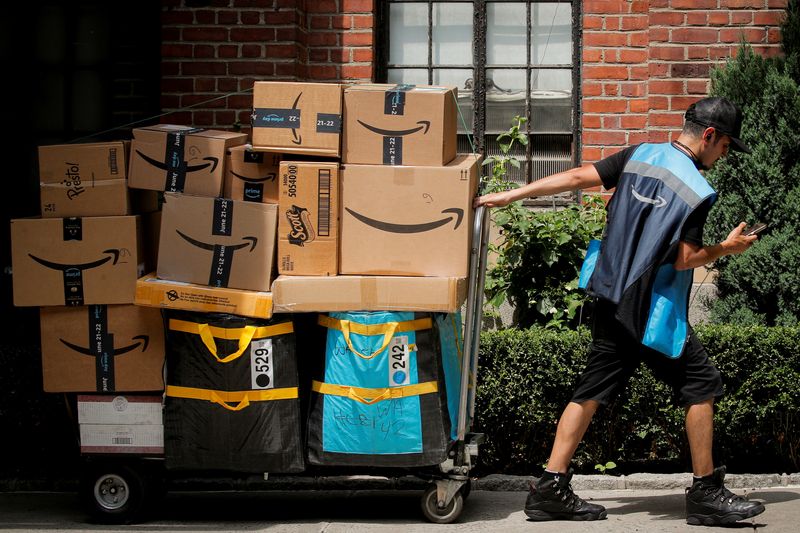By Lewis Krauskopf
NEW YORK (Reuters) -E-commerce titan Amazon.com (NASDAQ:AMZN) may be under increasing pressure to offer investors a dividend, as it now finds itself one of the few massive U.S. technology and growth companies not making regular payouts to shareholders.
Google parent Alphabet (NASDAQ:GOOGL) last week became the latest of the so-called Magnificent Seven group of market heavyweights to start paying a dividend, after Meta Platforms (NASDAQ:META) declared one in February. The announcements were followed by big post-earnings gains in the shares of both companies, though they were far from the only factor.
That has left Amazon and Tesla (NASDAQ:TSLA) as the only companies in the group that do not pay a dividend. Microsoft (NASDAQ:MSFT)'s payouts date back some 20 years, while Apple (NASDAQ:AAPL) and Nvidia (NASDAQ:NVDA) have been paying dividends for over a decade.
Amazon will report quarterly results and hold a conference call with analysts after the market closes on Tuesday, in the midst an earnings season that has produced mixed reactions to results by Big Tech companies.
“It certainly puts the spotlight on (Amazon) because now they’re really the last one standing in terms of Big Tech not paying a dividend,” said Nicholas Colas, cofounder of DataTrek Research.
“Dividends are representations of earnings power. So the fact that the rest of Big Tech has now decided to be able to exhibit earnings power and growth in earnings power with a dividend, that leaves them very much isolated versus the rest of the group,” Colas said.
David Katz, chief investment officer of Matrix Asset Advisors, said the dividend decisions by Amazon's peer group could have some influence.
"They could reasonably say, 'OK, the bigger players like Google, like Meta, have instated a dividend, we can do that as well,'" said Katz, whose firm owns shares of both Alphabet and Amazon.
While corporate profits are ultimately seen as a far more important driver of a company’s share price, dividends could increase a stock’s shareholder base - though they may take time to do so.
About $1 trillion was invested in dividend funds as of September, according to Morningstar. However, megacaps such as Meta and Alphabet may be off-limits to many of them, for now.
Many funds look for stocks that have dividend yields far higher than those offered by dividend-paying members of the Magnificent Seven, said Daniel Sotiroff, senior analyst at Morningstar Research Services. A yield is the dividend paid per share as a percentage of the current share price.
Meta shares, for example, currently yield 0.45% while Alphabet yields 0.47%. That is below the 1.44% yield of the overall S&P 500, and well below the yields of stocks such as Pfizer (NYSE:PFE) and 3M, which are both over 6%, according to LSEG data.
Among other Magnificent Seven members, Microsoft yields 0.74%, Apple yields 0.57% and Nvidia, whose shares are up 77% so far this year, yields a paltry 0.02%.
Other funds focus on companies that have consistently increased their dividends over time, and companies such as Meta and Alphabet lack such track records as new initiators.
Apple, however, was last year added to the popular Vanguard Dividend Appreciation ETF, Sotiroff said. The exchange-traded fund owned some $3.45 billion of the company’s shares as of the end of March, its second-biggest holding.

On the other hand, actively managed funds not bound by such restrictions could more immediately hop on board the shares of a company that just announced a dividend, Sotiroff said.
Or, "it might be individual investors that like it now because it is making a payout," he said.